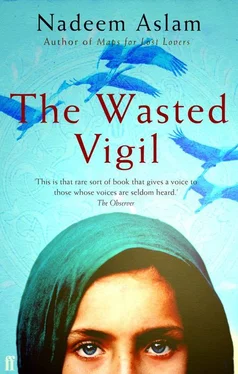Nadeem Aslam - The Wasted Vigil
Здесь есть возможность читать онлайн «Nadeem Aslam - The Wasted Vigil» весь текст электронной книги совершенно бесплатно (целиком полную версию без сокращений). В некоторых случаях можно слушать аудио, скачать через торрент в формате fb2 и присутствует краткое содержание. Год выпуска: 2009, Издательство: Faber and Faber, Жанр: Современная проза, на английском языке. Описание произведения, (предисловие) а так же отзывы посетителей доступны на портале библиотеки ЛибКат.
- Название:The Wasted Vigil
- Автор:
- Издательство:Faber and Faber
- Жанр:
- Год:2009
- ISBN:нет данных
- Рейтинг книги:4 / 5. Голосов: 1
-
Избранное:Добавить в избранное
- Отзывы:
-
Ваша оценка:
- 80
- 1
- 2
- 3
- 4
- 5
The Wasted Vigil: краткое содержание, описание и аннотация
Предлагаем к чтению аннотацию, описание, краткое содержание или предисловие (зависит от того, что написал сам автор книги «The Wasted Vigil»). Если вы не нашли необходимую информацию о книге — напишите в комментариях, мы постараемся отыскать её.
The Wasted Vigil — читать онлайн бесплатно полную книгу (весь текст) целиком
Ниже представлен текст книги, разбитый по страницам. Система сохранения места последней прочитанной страницы, позволяет с удобством читать онлайн бесплатно книгу «The Wasted Vigil», без необходимости каждый раз заново искать на чём Вы остановились. Поставьте закладку, и сможете в любой момент перейти на страницу, на которой закончили чтение.
Интервал:
Закладка:
Always hungry, always ill, the weak Soviet antibiotics of little use if ever they were to be had, many soldiers had thought of and talked about deserting, about defecting — an arc of movement in their minds, from Afghanistan to a country in western Europe, perhaps even the United States of America. They had been conscripted and sent out here and they drank antifreeze to escape from life for a few hours or left shoe polish to melt in sunlight and then filtered it through bread to obtain a sip of intoxicant. There were stories about what the Afghan rebels did to captured Soviet soldiers, loathing them as much for being non-Muslim as for being invaders — they who in trying to wipe out one Dashaka machine gun, or a journalist from the West, would literally flatten an entire village. Having dreamt that they had fallen into the clutches of the Afghans, the soldiers sometimes woke up screaming and were unable to fall asleep again for hours. Pillows of thorn. But there were other stories about how the Afghans welcomed defectors, especially if they agreed to convert to Islam.
Time slowed down around them as Benedikt and Rostov faced each other, Piotr watching from the darkness. Rostov had sold a ZPU-1 anti-aircraft gun to an Afghan warlord recently, writing it off as lost in combat, but he had begun to suspect that one of the captains at the base intended to expose him, and so he had ordered the captain and two other men chosen at random — Benedikt and Piotr Danilovich — to carry out a dawn reconnaissance mission in a nearby area, an area notorious as a hive of the most dangerous guerrillas. It was to be tomorrow. And although for safety reasons it was customary to take two vehicles, Rostov insisted the three of them take only one. Benedikt and Piotr had dreamed about desertion often but tonight was truly their last chance.
Piotr watched as Benedikt lowered the Kalashnikovs from his shoulders, time accelerating now. A forward lurch of Benedikt’s body towards Rostov. Piotr would tell Lara that he felt the slam of the body, saying he knew it was packed solid with fury at the abuse and drunken humiliation suffered by all the young soldiers at the hands of the officers. The blade moved back and forth three times. Twice in the stomach, and then again in the ribs. The man fell onto his side on the ground, one arm pinned under him, the other raised half-way in the air, the wet index finger trembling.
When Piotr and Benedikt were more than a mile from their military base, running towards the village they knew lay ahead in the darkness, Benedikt had stopped suddenly. ‘We have to go back.’ And he wouldn’t take another step, just shook his head when Piotr asked him to forget about the gemstones.
‘No, not the jewels. We have to go back for the girl.’
‘No.’
‘She’ll die.’
‘Better her than me.’
‘Most of Rostov’s blood is on my clothes. He was alive when we left him so we either go back to make sure he is dead or we get the girl. They’ll kill her in trying to save him.’
Death by exsanguination. The Soviet Army would kill prisoners by draining them of blood whenever transfusions were required for its battle-wounded soldiers.
The girl, Zameen her name was, had not provided any information regarding the rebellion after she was captured, though others had been made to talk successfully, and then it was discovered that Rostov and she had the same rare blood type. She was separated from the other prisoners. On one occasion Rostov even took her with him when he visited another city in case he sustained a serious injury there.
Benedikt led Piotr to a small wooden bridge and told him to wait underneath it, and, astonishingly, he was back with the girl in just over two hours. Rostov, he said, had dragged himself into the armoury, smearing red on the floor as he went, and though he was still alive at the end of that path of blood Benedikt had gone to the small room where Zameen was kept.
She was as dazed as she had always been — she had not uttered a word or made a sound since her capture — but now she spoke, startling them, saying Piotr and Benedikt must change the direction of their journey. She said she would take them to a place called Usha and then a little further beyond that to the house of her parents. Piotr was certain she was leading them into a trap — a month ago three Soviet soldiers were found hanging cut up in a butcher’s shop. The time he had spent alone in the darkness had altered him, when he had felt like a castaway on a vast black ocean, fears accumulating around him. Now terrified, he wanted to go back to the base. He arrived just before Rostov was discovered, and he was among the soldiers who were sent out into the night to hunt for Benedikt and the girl — but they were not to be found.
*
The breeze rustles through the branches of the silk-cotton tree. Lara has heard this sound captured on the recording of the bird that Marcus had made in this garden decades ago.
Another few days and then she’ll leave, another few days of sitting beside his aged form as they both drink the bright red tea he loves, a vague smile occasionally on his lips when he glances up from a page to tell her something. A Prospero on his island.
The mountain range looms above the house. On those quartz and feldspar heights at the end of 2001, American soldiers had ceremonially buried a piece of debris taken from the ruins of the World Trade Center, after the terrorists up there had either been slaughtered or been made to flee. Before these soldiers flew out to attack Afghanistan, the US secretary of defense told them they had been ‘commissioned by history’.
We sharpened the bones of your victim and made a dagger to kill you, and here now we lay the weapon to rest.
No. Perhaps something sacred is meant to grow out of the fragment of rubble. She thinks of the Church of the Resurrection on the banks of Griboyedov Canal in St Petersburg. It is known also as the Saviour of the Spilled Blood, built as it was on the spot where a bomb thrown by a member of the People’s Will revolutionary movement had mortally wounded Alexander II in 1881. The canal was narrowed so the altar could stand exactly where the royal blood had stained the pavement.
Always like a distant ache within her is the thought of landmines, so she cannot bring herself to go too far into the garden. She has seen single shoes being sold in Afghanistan’s shops.
She goes back into the house. Dusk, the hour between the butterfly and the moth. Standing in the dark kitchen she drinks water from a glass. She places the glass on the table and remains still, listening to her breath.
She has told him everything she knows about Zameen and Benedikt, all that Piotr Danilovich related to her.
‘Did they come to this house?’ she asked. ‘They were on their way here at the point where Piotr Danilovich’s story breaks off.’
‘Qatrina and I were not here at that time — the house was taken over by others,’ he replied, looking at her. The bereaved glance. ‘I don’t know if she brought him here. I had gone to a village to the west of here, where a battle between the Soviet Army and the rebels had left almost a hundred civilians wounded. Women and children mostly. The Cold War was cold only for the rich and privileged places of the planet. Qatrina remained here while I was away. There was no knowing when a doctor would be needed here . I returned to find her missing and was told that she had been taken away by the warlord Gul Rasool, the man from Usha who was one of the resistance leaders in this area. He wanted her to accompany his men into battle to treat the wounded. Nabi Khan, the other resistance leader from here, a great rival and enemy of Gul Rasool then as now, had the same idea soon enough and came to get me . There was nothing left here, no one in the house.’
Читать дальшеИнтервал:
Закладка:
Похожие книги на «The Wasted Vigil»
Представляем Вашему вниманию похожие книги на «The Wasted Vigil» списком для выбора. Мы отобрали схожую по названию и смыслу литературу в надежде предоставить читателям больше вариантов отыскать новые, интересные, ещё непрочитанные произведения.
Обсуждение, отзывы о книге «The Wasted Vigil» и просто собственные мнения читателей. Оставьте ваши комментарии, напишите, что Вы думаете о произведении, его смысле или главных героях. Укажите что конкретно понравилось, а что нет, и почему Вы так считаете.












